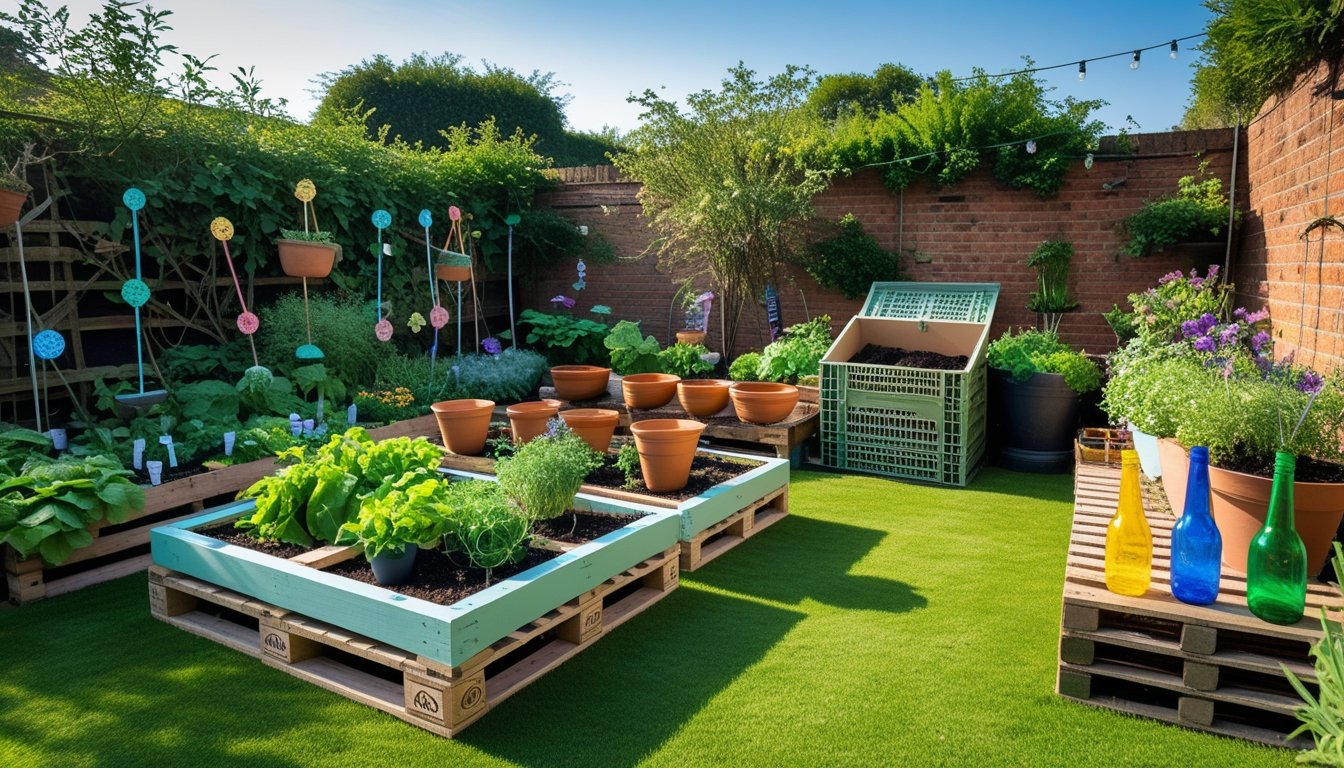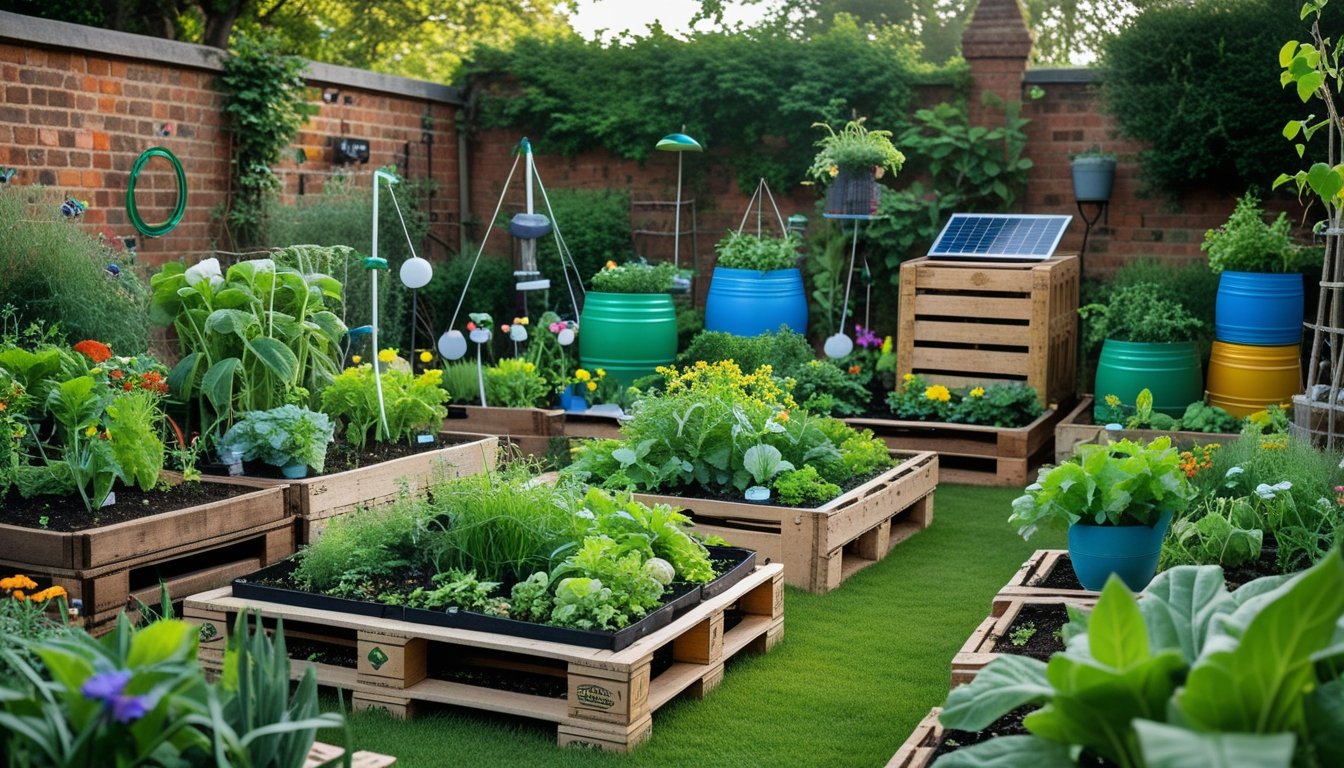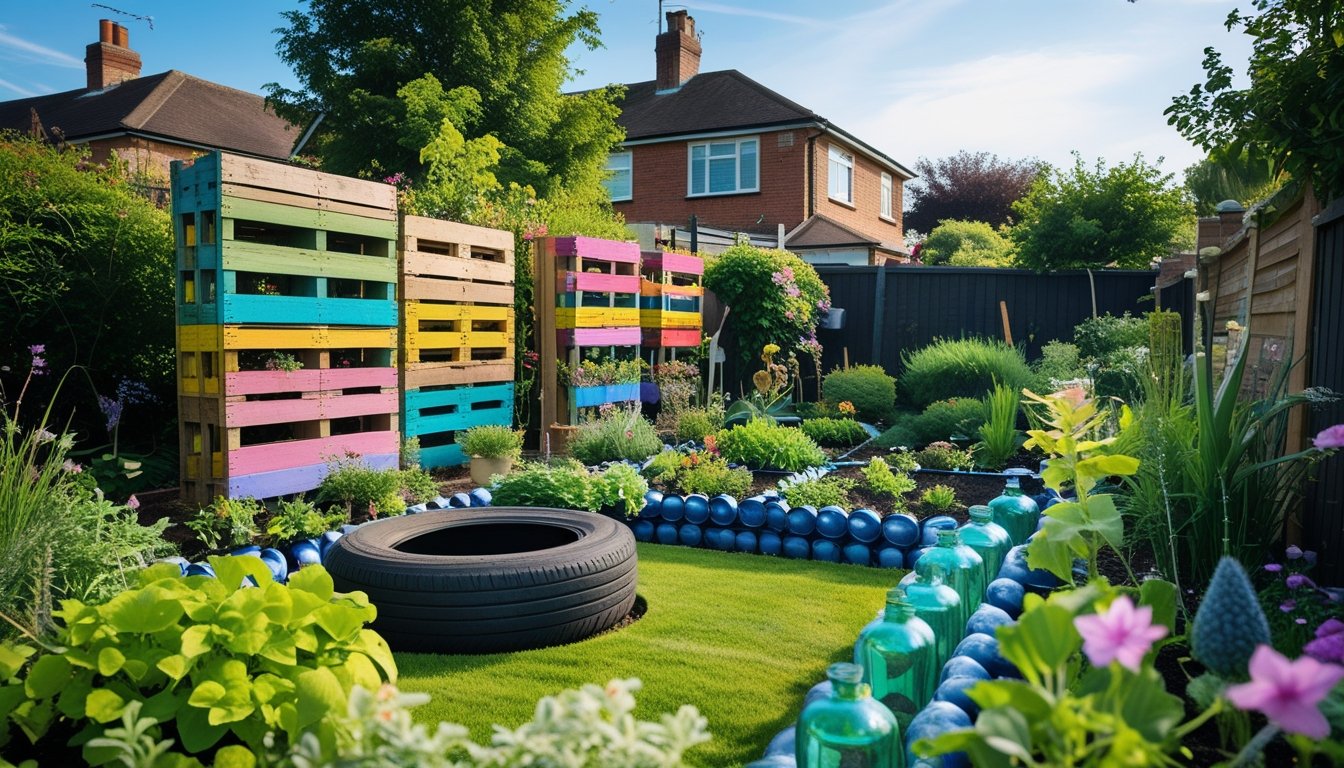Late updated: 07 Jun 2025 16:06
Written by: Emily Thornton
Innovative Ways To Use Recycled Materials In UK Gardens: Sustainable Solutions for Greener Spaces
Embracing the potential of recycled materials in our gardens not only reflects our commitment to sustainability but also adds unique charm and creativity to our outdoor spaces. Across the UK, gardeners are discovering impactful ways to convert discarded items into functional and artistic garden elements. From transforming old furniture into plant holders to reimagining plastic bottles as decorative garden features, we are limited only by our imagination.

By integrating recycled materials into our garden designs, we effectively reduce waste and promote an eco-friendly environment. This practice not only contributes to environmental conservation but also cuts down on expense, making gardening more accessible. It's remarkable how using items considered waste can lead to surprisingly beautiful, bespoke garden configurations that stand out.
Through our exploration, we'll uncover how gardening with recycled materials can be both practical and aesthetically pleasing. Let us dive deeper into how these sustainability practices can enhance the vitality and appeal of gardens throughout the country.
Key Takeaways
- Recycled materials can create unique and sustainable garden features.
- Integrating recycled materials helps reduce waste and promote eco-friendly practices.
- Creativity and imagination drive the potential uses of recycled items in gardens.
Innovative Uses of Recycled Materials in UK Gardens
In our journey to reduce waste and enhance garden design, we explore creative and sustainable ways to use recycled materials in UK gardens. From unique planters to functional structures, these innovative ideas invite us to reimagine household items for eco-friendly gardening.
Creative Planters and Containers
Recycled materials open a world of creativity for planters and containers. Old tyres can be transformed into eye-catching planters with some vibrant paint, offering both durability and visual appeal. Similarly, repurposed containers like hanging planters or vertical gardens can be crafted using items such as plastic bottles or metal cans. These options not only reduce waste but also offer unique features to personalise our outdoor spaces.
Tire planters can be stacked for added height, giving depth to the garden layout. Meanwhile, tin cans can be adorned with patterns or left as they are for an industrial look. These containers contribute to our sustainability goals by extending the life of materials that might otherwise be discarded.
Sustainable Raised Beds and Garden Edging
Building raised beds from reclaimed wood or other recycled materials promotes sustainable living and gardening. Using materials like old pallets or bricks allows us to create robust garden structures without the environmental costs associated with new resources.
Reclaimed bricks serve as an excellent medium for garden edging, providing both durability and a rustic aesthetic. These materials not only bring unique character to our gardens but also offer cost savings by avoiding the purchase of new materials. Repurposing timber into raised beds ensures that our gardening practices minimise waste while boosting the productivity of our planting spaces.
Eco-Friendly Garden Decor and Art
An expressive aspect of garden design, art and decor from recycled items bring charm and individuality to any garden. With a little imagination, discarded items turn into garden art. Empty glass bottles can be painted or simply reused in their natural form as ornamental elements.
Tin can lanterns offer atmospheric lighting for evening gatherings while being straightforward to craft. Old metal or wood can be transformed into bird feeders, adding both beauty and function by supporting local wildlife. Incorporating these elements into our gardens strengthens our connection to eco-conscious living while creating captivating visual features.
Repurposing for Functional Structures
Functional structures such as cold frames and mini greenhouses can be fashioned from salvaged windows or glass doors. These structures extend our growing season, aiding germination and plant growth while making substantial use of discarded building materials.
Repurposing versatile items like wood crates into stylish outdoor furniture contributes to a unified garden aesthetic as well as practical use. It’s a way to maximise every inch of our gardens by cleverly reusing materials. As we embrace these innovative solutions, we not only enhance our gardens but also champion responsible and sustainable management of resources.
Enhancing Garden Sustainability With Recycled Materials

Recycled materials offer practical solutions for garden sustainability by transforming waste into resources. By implementing eco-friendly strategies, we can significantly reduce environmental impact and promote a sustainable lifestyle.
Composting And Mulching Solutions
Composting is a fantastic way to recycle kitchen scraps and garden waste. Creating nutrient-rich compost enhances soil health and reduces reliance on chemical fertilisers. Compost bins can be easily constructed from reclaimed wood or other materials, helping us manage waste effectively.
In addition to composting, applying mulch made from shredded leaves or other organic materials conserves moisture and suppresses weeds. This approach contributes to sustainable living by reducing water needs and extending the life of existing resources. Utilising natural mulches also benefits the environment by gradually enriching the soil as they decompose.
Water Management And Irrigation Improvements
Effective water management is crucial for any eco-friendly garden. By reusing materials such as old plastic bottles or barrels, we can create simple yet effective irrigation systems. Placing bottles with small holes around plants provides targeted watering and reduces runoff.
Rainwater collection is another method to conserve water. Recycling large containers into rain barrels allows us to capture and store rainwater for later use. This not only helps in conserving water but also supports the bigger goal of reducing the garden's overall environmental footprint. Installing these systems can be straightforward, saving both water and money over time.
Boosting Biodiversity And Wildlife Habitats
Recycled materials can play an essential role in creating habitats for a variety of wildlife. For instance, old bricks or logs can be creatively repurposed into garden pathways that double as animal shelters. By integrating these structures into our designs, we encourage biodiversity.
Additionally, using scrap wood to build bird feeders helps attract birds, promoting a balanced ecosystem. Old items like tin cans can be turned into planters or mini-habitats for insects, boosting the natural advantages they offer. By integrating these recycled elements, we create inviting spaces for wildlife while fostering an environmentally conscious garden.
Frequently Asked Questions

Using recycled materials in garden design is both practical and eco-friendly. We explore creative approaches to repurposing items for greenhouses, containers, fertilisers, furniture, glass, and water features, allowing for unique and sustainable outdoor spaces.
How can one construct a greenhouse with repurposed items?
Creating a greenhouse from repurposed materials can be both cost-effective and rewarding. We can use old windows to construct the frames and enclose the structure. Wooden pallets and discarded doors serve as sturdy supports. Such a greenhouse not only makes use of salvaged items but also blends perfectly into a garden's natural aesthetic.
What methods exist for crafting plant containers from reclaimed materials?
Reclaimed materials offer a versatile and charming option for plant containers. Old barrels, tins, or ceramic dishes can be transformed into stylish pots. By employing used wooden crates or baskets, we create rustic and unique planters. With a bit of creativity, anything that can hold soil might become a home for plants.
In what ways can household waste be transformed for garden fertilisation?
Household waste provides rich nutrients for gardens. We can compost kitchen scraps like vegetable peels and eggshells, turning waste into a valuable fertiliser. Used coffee grounds can enrich soil acidity, while shredded paper or cardboard makes excellent brown material for compost piles. These simple methods offer sustainable and economical fertilisation options.
How can old furniture be innovatively incorporated into garden design?
Old furniture can find new purpose in garden landscapes. A wooden chair might become a quirky planter display or a vintage table can serve as a potting bench. Even a headboard could be used to create garden trellises or support climbing plants. Repurposing furniture adds unique character and function to outdoor spaces.
What creative uses are there for recycled glass in outdoor spaces?
Recycled glass offers many possibilities for innovative garden design. We can use broken glass pieces to create colourful garden mosaics or path edging. Wine bottles make excellent borders for flower beds or act as unique garden lamps when cut and arranged creatively. Glass shards reflect sunlight, adding vibrant beauty and charm.
Can you recommend techniques for creating water features with salvaged components?
Water features can be crafted from salvaged components with stunning results. Using an old bathtub or basin can create an exquisite garden pond. We may employ rusty troughs or barrels as containers for small fountains. By combining various reclaimed items, these features become focal points that enhance the garden's tranquillity and appeal.
